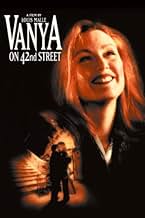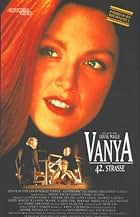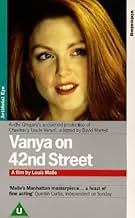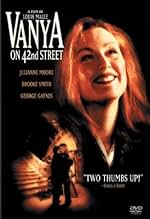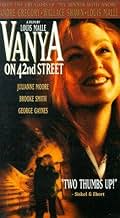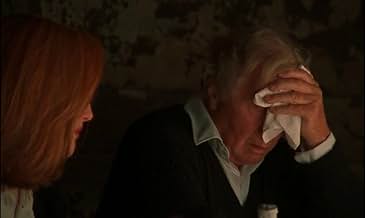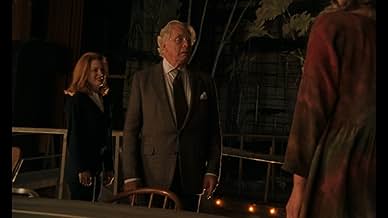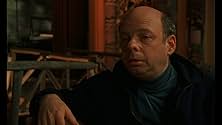AVALIAÇÃO DA IMDb
7,3/10
5,5 mil
SUA AVALIAÇÃO
Atores de Nova Iorque ensaiam "Uncle Vanya" de Chekhov num teatro em ruínas.Atores de Nova Iorque ensaiam "Uncle Vanya" de Chekhov num teatro em ruínas.Atores de Nova Iorque ensaiam "Uncle Vanya" de Chekhov num teatro em ruínas.
- Direção
- Roteiristas
- Artistas
- Prêmios
- 3 vitórias e 13 indicações no total
- Direção
- Roteiristas
- Elenco e equipe completos
- Produção, bilheteria e muito mais no IMDbPro
Avaliações em destaque
Other more articulate than I have said most of the positives. I rented this video because it was on a list and Louis Malle directed it. Having studied Chekov many years ago, I thought maybe this was just a campy title for a film that had nothing to do with Uncle Vanya. It turns out that it drew me back to the starkness of Chekov, forcing each character to carry a heavy burden to be engaging. I can't complain about one actor. It took me a while to accept Wallace Shawn, not as the volatile guy who has seen life pass him by and blames everyone else. To see him as a possible romantic character struck me as absurd at first, and then I saw his desperation and how he loves. He is far from a handsome man, perhaps we could say anything but handsome. And yet every time I see him I am captivated. He recently played a college professor on the sequel to the Big Bang Theory, "Young Sheldon." His confidence and the spark he exuded on that show are the opposite of his Uncle Vanya. For two hours I was captivated by this film, listening to every word, waiting for every interaction. Usually, I don't care for contrivances in film (Hamlet, for instance, set in the hippy community of 60's San Francisco), but if one has never seen Chekov, this is Chekov in all its "glory."
Chekhov's Uncle Vanya stripped down to its bare essentials when a group of New York actors rehearse in a decaying theatre with no set dressings or props but just their talent, accompanied by David Mamet's modern adaptation of the play. Off course it may be stagy but you fall under the actors spell and that's what it's all about.
I sympathise with the Russian poster who took exception with Mamet's tampering with Chekhov but I still admire this film a great deal. As a non-Russian and non-Russian speaker I have loved Chekhov since the time I was able to distinguish great writing from mediocre and I have always felt that no matter how fine a given translation I was still losing the occasional untranslatable nuance to which Russian speakers have access. Vanya is also one of my favourite Chekhov plays and I just wallowed in this wonderful version. It's magical the way that once inside the rehearsal space with the actors schmoozing Wally Shawn stretches out on a bench almost imperceptibly and Larry Pine asks Phoebe Brand casually how long they've known each other and unless you really know Chekhov you'd think this was just actor small-talk instead of the first lines in the play between the Doctor and Nanny,or, to put it another way, Malle has led us both artfully and seamlessly into the performance and then, having done so, he throws in a touch of the Brechts by deliberately reminding us we're watching actors acting and not people living. The first time he tips his glove is via Wally Shawn's cup which has I Love NY written on it then later Andre explains to the visitors (who, I suspect, have been planted there for just that purpose) that it's now a different time. The acting throughout is beyond praise and a wonderful high note for Louis Malle to end his career. 10 out of 10 going away.
There's no shortage of intelligent work in film. But here we have one of the most complexly referential things I've ever seen. Simple self-reference points to itself. Common self-reference points to the viewer defining the experience.
But Mingus used to say why have three threads when you can have seven? Here, some of the most adventurous thinkers in film give us four threads, actually four and a half.
We have the Chekhov play and the Mamet wrapping. Make no mistake that this is not an editing or a translation, but an annotation. We have two perspectives simultaneously. Add to that the notion of the play not as a play for an audience as intended, but an event conducted regularly by the performers for their own sake. This is a creation orchestrated by Gregory, the third thread. One can clearly see in some scenes neither Chekhov nor Mamet but artists collaborating in dialogs. The inner eyes and the outer eyes differ.
Fourth, we have Malle's creation which introduces us into the equation with deliberately shaky and sometimes misframed camerawork. We aren't part of any prior experience, but the actors do include the camera in their collaboration, as an independent thread. Watch how Andre works the camera.
And finally, we have the framing of the artists in real life. This is not simultaneous with the others and in any case excludes the filmmaker.
I recall seeing Paul Newman in the Color of Money in the first scene, acting on three levels simultaneously. It took my breath away. Here, the purpose of the whole contrivance is to challenge the actors (and the viewers!) to participate in a jazz ensemble of acting where the layer of reality is constantly shifting. They chose Uncle Vanya as the base for a reason, because his evershifting foci of love and hate in pairs provide cues for levelshifting.
Shawn really plays on this. His skill wasn't apparent to me on first viewing, especially in the first scenes, where all players are on stage and the non-focus actors have to be invisible. But on repeated viewings one can see his mastery, his shifting forehead! Maybe he could have been a Dostoyevsky. The two young women should be celebrated to the heavens for what they do together. I never believed so many giggles and gasps and stutters and excited silences could be so finely woven, tossed so lightly.
This is really, really good stuff, very smart. So far as an intelligent construction you won't see a superior. I never expect to see four levels at once again in film at least centered in the acting.
But Mingus used to say why have three threads when you can have seven? Here, some of the most adventurous thinkers in film give us four threads, actually four and a half.
We have the Chekhov play and the Mamet wrapping. Make no mistake that this is not an editing or a translation, but an annotation. We have two perspectives simultaneously. Add to that the notion of the play not as a play for an audience as intended, but an event conducted regularly by the performers for their own sake. This is a creation orchestrated by Gregory, the third thread. One can clearly see in some scenes neither Chekhov nor Mamet but artists collaborating in dialogs. The inner eyes and the outer eyes differ.
Fourth, we have Malle's creation which introduces us into the equation with deliberately shaky and sometimes misframed camerawork. We aren't part of any prior experience, but the actors do include the camera in their collaboration, as an independent thread. Watch how Andre works the camera.
And finally, we have the framing of the artists in real life. This is not simultaneous with the others and in any case excludes the filmmaker.
I recall seeing Paul Newman in the Color of Money in the first scene, acting on three levels simultaneously. It took my breath away. Here, the purpose of the whole contrivance is to challenge the actors (and the viewers!) to participate in a jazz ensemble of acting where the layer of reality is constantly shifting. They chose Uncle Vanya as the base for a reason, because his evershifting foci of love and hate in pairs provide cues for levelshifting.
Shawn really plays on this. His skill wasn't apparent to me on first viewing, especially in the first scenes, where all players are on stage and the non-focus actors have to be invisible. But on repeated viewings one can see his mastery, his shifting forehead! Maybe he could have been a Dostoyevsky. The two young women should be celebrated to the heavens for what they do together. I never believed so many giggles and gasps and stutters and excited silences could be so finely woven, tossed so lightly.
This is really, really good stuff, very smart. So far as an intelligent construction you won't see a superior. I never expect to see four levels at once again in film at least centered in the acting.
Malle's adaptation handles Tchekhov's notoriously difficult shifts in mood and context excellently, investing every scene and almost every word with an edge of ambivalence and frustration, and the performances are all first-rate. Moore in particular, from her first appearance in the film (which is without dialogue) to the final scene constructs a really intelligent performance as Yeliena, I feel, and she seems to cover the whole gamut of Yeliena's character from the giggly and superficial to the introspective.
With all due respect to the American school this film could have descended easily into overwrought Tennessee Williams-esque Naturalism with lots of method-style spitting and uncomfortable truth. Instead the intellectual, spiritual dimensions of Tchekhov's play are always brought to the fore, in addition of course to Tchekhov's dark brand of humour, where the actors (particularly Julianne Moore) laugh through their tears and visa versa. Avoiding the common temptation of drawing out the play's anguished characters at a snail's pace, Malle also paces the film well, with an emphasis on lightness and subtlety of delivery - the result is both intellectually and emotionally satisfying.
With all due respect to the American school this film could have descended easily into overwrought Tennessee Williams-esque Naturalism with lots of method-style spitting and uncomfortable truth. Instead the intellectual, spiritual dimensions of Tchekhov's play are always brought to the fore, in addition of course to Tchekhov's dark brand of humour, where the actors (particularly Julianne Moore) laugh through their tears and visa versa. Avoiding the common temptation of drawing out the play's anguished characters at a snail's pace, Malle also paces the film well, with an emphasis on lightness and subtlety of delivery - the result is both intellectually and emotionally satisfying.
Você sabia?
- CuriosidadesFinal film directed by Louis Malle.
- Erros de gravaçãoIn the different acts, some people change clothes, while others don't. Sonya, for instance, wears two different dresses. In a run-through people don't change clothes.
Principais escolhas
Faça login para avaliar e ver a lista de recomendações personalizadas
- How long is Vanya on 42nd Street?Fornecido pela Alexa
Detalhes
- Data de lançamento
- Países de origem
- Idiomas
- Também conhecido como
- Vanya on 42nd Street
- Locações de filme
- Empresas de produção
- Consulte mais créditos da empresa na IMDbPro
Bilheteria
- Faturamento bruto nos EUA e Canadá
- US$ 1.746.050
- Fim de semana de estreia nos EUA e Canadá
- US$ 17.636
- 23 de out. de 1994
- Faturamento bruto mundial
- US$ 1.746.050
Contribua para esta página
Sugerir uma alteração ou adicionar conteúdo ausente


